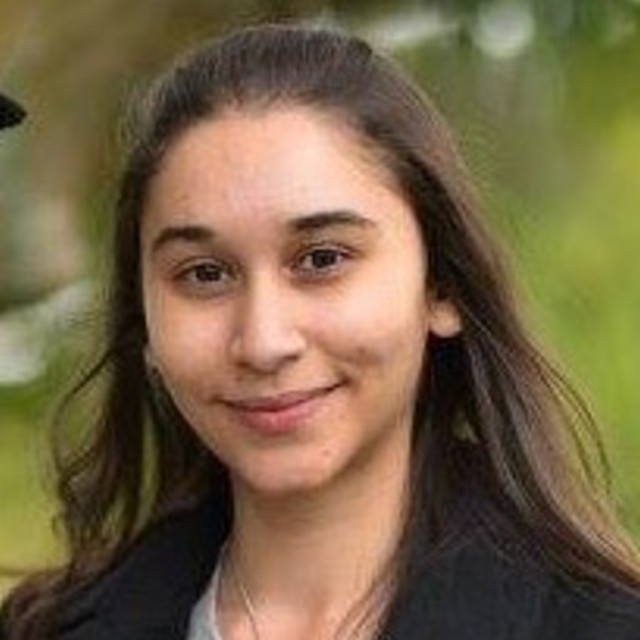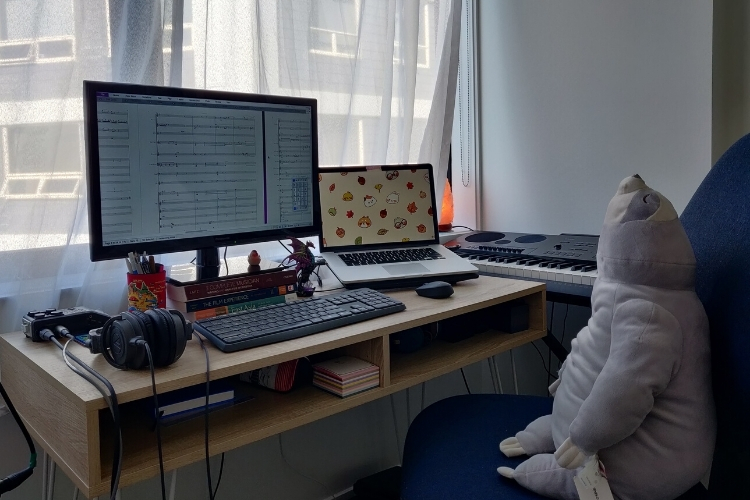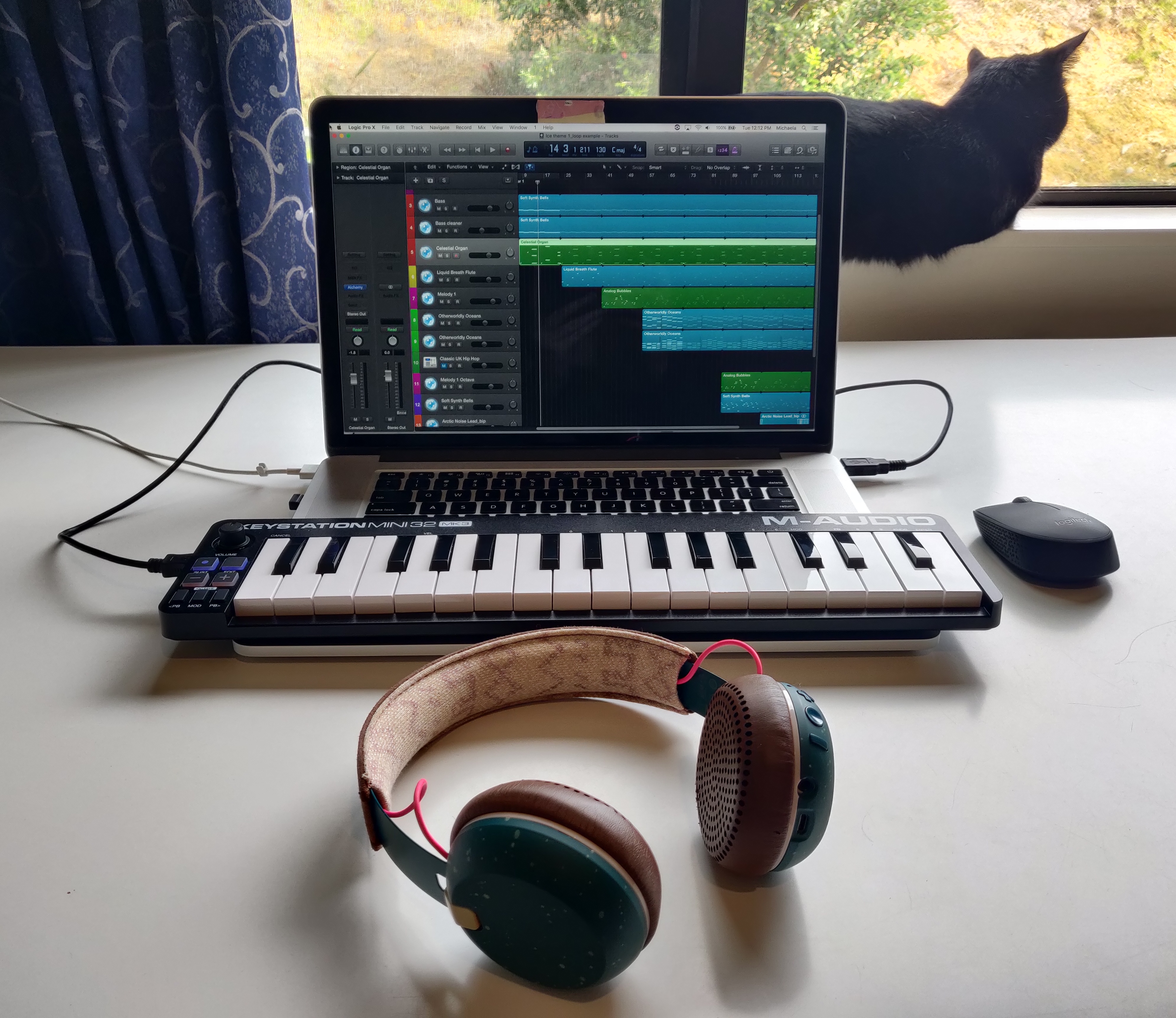In our Composer Spaces series, we ask composers to share a bit about their working environment and to give us a brief insight into their process. This week we present composer Michaela Cornelius.

What does a typical composing day look like for you?
My ideal composing situation is that I compose five days a week, first thing in the morning for a few hours. But realistically other commitments and projects pop up, so I keep it flexible. Usually when a deadline is coming up, I have a few weeks when I'm focused solely on composing in the mornings. Although I’m not an early riser, I find it best to work in the mornings and set that time aside for composing so that I don’t get distracted by other commitments.
Please describe the space where you compose your music. What makes this space special and why have you chosen it?
I have my composition setup in a corner of my room. It's not ideal composing in my bedroom because it's always tempting to take naps! But it's a quiet corner with minimal distractions and a place where I can always be alone to focus if I need to. Out the window, there's a hotel. Usually I keep the curtain closed, but occasionally I see weird things happening.
My ideal composing space would be a separate room with lots of natural light and a view that looks out on to nature of any kind. It’d be great to have a dedicated composing space so that it’s easier to set composition work aside once I leave the space.
 My composition space at home.
My composition space at home.
What equipment (including software) do you have in your space? Is there anything special, interesting or quirky about it?
My setup has taken a few years to get to where it is now, and I’m currently quite happy with the equipment I have. If anything, I’d just like to have less cables! I connect my Macbook to a bigger screen, and I have a Bluetooth keyboard and mouse. I have a MIDI keyboard and a couple of guitars. My Zoom H6 field recorder also doubles as an interface when I need to record things straight on to my Mac. In terms of software, I mainly use Pro Tools, Logic and Sibelius. I find Pro Tools is great for editing audio and for mastering, and Logic is great for working with VSTs and synths. Sibelius has its issues, but it gets the job done when I need to create scores. To add some character to my space, I usually have something cute or related to dragons on my desks. You can almost always find me sipping a cuppa tea whilst I’m working!
I also have a fully portable setup which fits perfectly in my backpack – my Macbook, headphones and a 32-key MIDI keyboard. The game development team that I work with has weekly meetings where we catch up and work together, so having a portable setup is really important. It also means I can travel and be assured that if inspiration or work strikes, I’ll have everything I need.
 My portable composition setup. This was in Waipu while I was on holiday. My cat, Indie, kept me company, and we both enjoyed looking at the birdlife out the window (probably for different reasons).
My portable composition setup. This was in Waipu while I was on holiday. My cat, Indie, kept me company, and we both enjoyed looking at the birdlife out the window (probably for different reasons).
Please describe your typical composing process. Does it change with each piece?
I’m currently at a stage where each composition process is really different. This is because I’m especially making a point to experiment with different processes each time, and I’m focusing on determining structure before I start composing. Generally, I have two types of composition processes – one when I compose for video games and one when I compose contemporary classical music. The mobile game I’m currently composing for, To the Stars, has electronic music. I mainly use Logic and experiment with synths to create layers for each track, and then use Pro Tools to fine-tune the mixing and mastering. I rarely notate what I come up with, and everything starts off in MIDI. When composing contemporary classical music, I usually improvise on my keyboard or sing and just think about the piece in my head before realising it. I work in Sibelius as scores are generally needed for these compositions, and there’s less emphasis on creating a nice-sounding audio rendition.
I find inspiration mostly in fiction but also in personal experiences. I find it hard to compose about a topic that I don’t personally feel interested in, so sometimes it takes a while to find a topic or perspective that resonates with me.
What are you currently working on in your space?
I’ve composed the opening theme for a podcast on philosophy, Confuddled, and it’s recently been released. It was a fun experience collaborating with friends, and the end result is a quirky tune. It’s also the first of my work that’s on Spotify and iTunes!
I’ve taken on a year-long project to create a piece for solo cello with live electronics. I was inspired by a short story by H.P. Lovecraft, and I think the combination of cello and electronics will suit the theme perfectly. Learning about sonic arts and working with Max MSP in the first half of the year has been an eye-opening experience. There are many challenges and limitations, but finding ways to overcome that was the first major breakthrough I experienced for this piece.
My recent work for orchestra, Transmutation, will be workshopped by the APO as part of the Our Voice initiative, and it will also be performed by the NZSO later in the year as part of the Todd Corporation Young Composer Award. This is my first orchestral work that will be performed. I’m really grateful to have the opportunity to hear the piece performed by both a chamber orchestra and a symphony orchestra.
